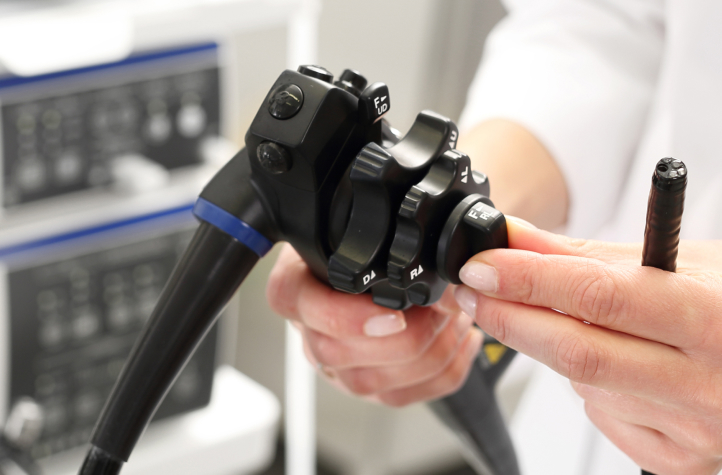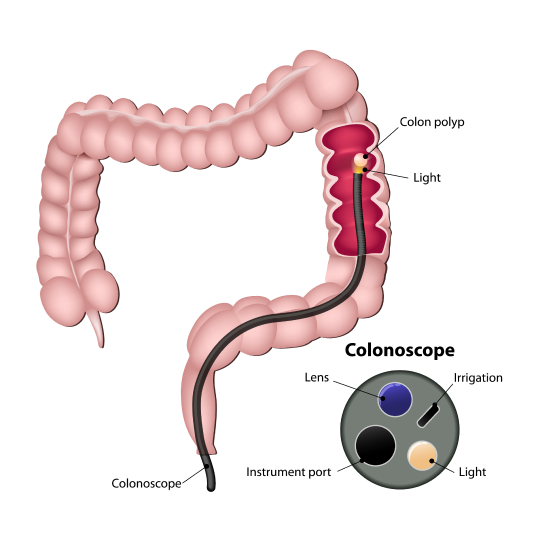
What is a Colonoscopy?
A colonoscopy is a procedure that examines the inside of the colon and rectum, the lower part of the digestive tract. As a screening tool, colonoscopy helps detect early signs of cancer, such as polyps, even before they become cancerous. As a diagnostic tool, it can identify the cause of symptoms like rectal bleeding, abdominal pain, and changes in bowel habits. However, it can also be used as a therapeutic procedure such as in the removal of polyps.
A colonoscopy is typically an outpatient procedure, usually taking 30-60 minutes to complete. In Singapore, regular colonoscopies are recommended starting from 50 years old for average-risk individuals. However, individuals with a family or personal history of colorectal cancer or polyps may require more frequent and earlier screenings.
How Does a Colonoscopy Work?
A colonoscope is a long, thin and flexible tube that is connected to a small light source and camera at the end of the tube.
With the patient being sedated, the colonoscope is gently inserted through the anus and threaded through the entire length of the colon, transmitting real-time images that are projected onto an external screen that doctors can see.
Through these images, doctors will be able to clearly examine the internal lining of the patient’s colon and rectum, looking out for the presence of any abnormalities (such as polyps) along the way.

What Happens When a Polyp is Found?
You might be worried knowing that a polyp has been found in your colon. Not to worry, because:
- Polyps can be easily removed on the spot during a colonoscopy
- Most polyps are harmless (a minority, however, may develop into colon cancer over time)
- Once the polyp is removed, it will be sent to a lab (biopsy) to determine its nature – whether it is benign or pre-cancerous.
If a polyp is found, it is immediately removed so there is no chance for it to even turn into cancer. Your doctor will also recommend a personalised screening plan for you moving forward.
When Do I Need to Get Screened?
If your results come back clear, you will only need to go for a follow-up screening after at least 5 to even 10 years’ time.
Regardless, your doctor will be in the best position to advise you on whether you are due for a colonoscopy, and what your screening schedule should be.
What to Expect During the Colonoscopy Procedure?
In the days leading to your colonoscopy, you will be required to follow a special diet (e.g. clear liquids, low-fibre) and take laxatives to cleanse your colon right before the procedure. Your doctor may also ask you to temporarily adjust your medications and supplements. Lastly, you will need to fast for six hours beforehand to ensure your safety under anaesthesia
During the procedure, you will be positioned on your side. Then, the doctor will gently insert a colonoscope (a thin, flexible tube with a light and camera) into your rectum to examine your colon. Air may be gently introduced to inflate the colon and improve visibility. If necessary, polyps or suspicious tissue samples may be removed (biopsy).
Patients usually experience bloating, gas, and mild cramping after the procedure. These symptoms usually subside within an hour. Some light bleeding in the first bowel movement is normal. However, if you experience severe abdominal pain, dizziness, fever, or persistent bleeding, contact your doctor immediately.
Colonoscopies are a painless and quick procedure that can yield highly accurate and potentially life-saving outcomes, so find out from a doctor if you are already due for one.
FAQs About Colonoscopy
What are the possible complications of colonoscopy?
What are the results I can expect after a colonoscopy?
Your doctor will schedule a follow-up appointment to discuss the results of your colonoscopy. If the results are negative, it means that there are no abnormalities found. However, regular screenings are still recommended, typically every 10 years for average-risk individuals.
However, if polyps or other abnormalities are found, further evaluation and treatment may be necessary.
